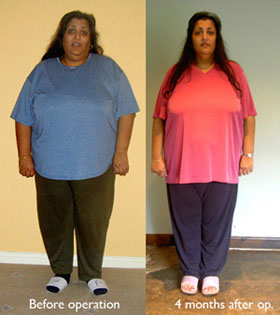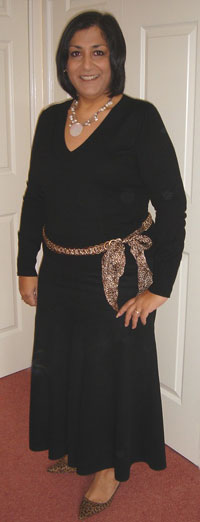My Route to RNY in the UK
My journey to a Roux en Y in the UK started in August 2003. I'd suffered from morbid obesity for almost all of life and, like everyone else who ends up on the operating table, I'd tried more diets and slimming clubs than you could shake a stick at. It was one area in my life at which I was a spectacular failure. I'd eventually resigned myself to that but was worried about my health. So far it was bearing up, although my mobility was rapidly decreasing, in correlation with my increasing back and joint pain. I was desperate and desperately worried but I didn't know what I could do. I did not share my fears with anyone as I was so ashamed of myself - and I didn't need to be told to try another diet and join the gym. I'd done plenty of that.
One day, at a family gathering, my brother took me aside. He explained he'd had a patient that week who'd told him about her RNY (he's an optometrist). He told her he had a sister with a weight problem and she insisted that he offered me her contact details.
I called the lady, Barbara. She'd had an RNY with Mr Steve Pollard in Leeds 6 years earlier, in 1997. She gave me a lot of information, and was pretty evangelical about both the surgery and the surgeon. Armed with the name of the surgery, I got onto the internet and found out as much as I could. Meanwhile, an appointment was booked for a consultation with Mr Pollard. In the three weeks I had to wait for that, I looked up and read as much as I could find. But I never came across any UK based information, everything was in or from the US.  At that stage, I thought Mr Pollard was the only surgeon performing bariatric surgery in the UK and that open RNY was the only option, apart from banding. (I'd previously heard of banding, jaw wiring and basic 'stomach stapling' but had ruled all those options out for myself.)
At that stage, I thought Mr Pollard was the only surgeon performing bariatric surgery in the UK and that open RNY was the only option, apart from banding. (I'd previously heard of banding, jaw wiring and basic 'stomach stapling' but had ruled all those options out for myself.)
My consultation went very well and I felt great trust and respect for Mr Pollard, I really liked him and wanted him to look after me. He told me I'd be a good candidate for surgery and he'd be happy to take me on. But he wouldn't sign me up there and then, he told me to go away and think about it carefully and all the things he'd been through with me (how it would affect my life afterwards, the risks, the scarring etc). He told me to look up what NICE say about it and also gave me a card for WLSinfo and told me to see what people on the site said about it, and to contact some of them.
It was when I took his advice about this site that I discovered that there were other surgeons and other surgery types. I suddenly had options I'd never known existed. There weren't as many options as there are today, but there were some. At that time, there were two other UK surgeons performing bariatric surgery, Mr Kerrigan in Liverpool and Mr Dexter in Leeds. As well as RNY and banding, they also performed the DS. And they both carried out their surgeries laparascopically. This latter point was of particular interest to me. I knew US surgeons did the op keyhole and I'd asked Mr Pollard if he'd do me that way, and he'd refused and given me his reasons for only doing the op open. I accepted them but was still tempted by the shorter recovery time (I have a demanding job) and the much reduced risk of incisional herniation. Reduced scarring would be an added bonus but was not a primary concern of mine.
These new options put me in a real quandary. I felt a great affinity with Mr Pollard but here I was reading about people in the UK who felt the same way about their other surgeons. And they had more choice than I did because Mr Pollard only did the RNY and only did it open, whereas Mr Kerrigan and Mr Dexter also offered  the DS and laparascopic surgery. It was such a dilemma, everything was up in the air for me, having previously all been settled in my mind.
the DS and laparascopic surgery. It was such a dilemma, everything was up in the air for me, having previously all been settled in my mind.
There was also a further dimension - surgery abroad. I read of many people who went to overseas surgeons, most commonly Belgium and Germany, for surgery of all three types. They did so because the costs were much cheaper, almost half what they were in the UK. They reported that hospitals there were clean and well equipped, that the surgeons were top class and that the nursing staff were caring and professional. But for me, this was never an option I seriously considered. I fully respected the choices and experiences of those who went abroad, but it was not something I could entertain doing for myself. I needed the comfort of knowing that I could get into the car at any time of the day or night and get to my surgeon whenever I needed to. That if I collapsed I could be taken by ambulance to my surgeon if necessary (yes, I am a pessimist and like to prepare for the worst).
I wanted to be operated on by a surgeon who had been trained in a UK hospital under the NHS regime, where they would understand exactly how the NHS operated at every tier and could advise me how to get the best aftercare and support from the system. Also, working in the NHS meant that the surgeon would be regularly on call, and most probably a "general surgeon" which means they can perform surgery on almost any part of the body in an emergency situation if they have to, and also have specialist skills in their own areas. Mr Pollard's specialist area is livers, he heads up one of Europe's busiest transplant centres. Other bariatric surgeons specialise in different areas, but they are all general surgeons who specialise in the upper gastro-intestinal tract - the part of the body most likely to need any further support as a result of any complications from my RNY. There is no 'comfort zone' for an NHS surgeon, in contrast to those with a purely private practice where he or she can choose exactly what procedures will be performed, and on which patients. I like the fact NHS surgeons are 'kept on their toes'.
So this was the start of my own list of criteria, now I knew I had a choice to make. I am by profession an HR director in a law firm, and some habits die hard. I drew up a 'person specification' for the person I wanted to 'appoint'. I set out essential and desirable criteria:
Essential
- UK hospital
- Surgeon currently working in the NHS
- Surgeon had at least five years' experience of performing the operation (I would not recruit a solicitor to conduct a complex caseload if they did not have a minimum of 5 year's experience of a similar type of cases, so why should I accept any less for my body?)
- Some guarantees about the care available and costs involved in immediate post operative complications
Desirable
- Offered the DS (the only other op I was interested in)
- Offered laparascopic surgery
Cost and aftercare
While cost was not an overriding consideration for me, the unforeseen cost of further emergency surgery was an important factor. I had read on the site about people with leaks and other complications who'd needed other procedures, tests etc performed. I couldn't think of anything worse than coming round from surgery to find out that something had gone wrong, I'd been whipped back for further surgery, I'd be in hospital a few extra weeks as a result and I'd get the bill (of several tens of thousands of pounds) to settle before discharge! Mr Pollard operated privately under BUPA (now Spire). The cost of the op (£10,200 at the time) included a package of up to 30 days in hospital plus any surgery, treatment or tests needed in that time. The other UK providers had similar arrangements with their hospitals. So they all ticked the boxes on that score. As it happens, I was readmitted when I was 29 days post op, I was kept in for a week and underwent several tests, including barium swallows etc. None of this cost me a penny.
Looking at my criteria, in 2003 I had no real choice if I was to stick to those. Steve Pollard was the first UK surgeon to perform the RNY and at that time he'd performed the highest volume. He'd been doing the op since 1995 and when I saw him in 2003 he'd performed over 1100. I reasoned that he therefore had seen more patients, and more complications and difficulties, as a result. This would leave him better placed to look after me, he'd have more experience to draw on. The other UK surgeons came nowhere near to matching Mr Pollard, in terms of length of time and volume, in 2003. Crucially, they did not have a minimum of 5 years' experience of this type of surgery and this was one of my essential criteria.
Because of my desire for laparascopic surgery, and my serious interest in the DS, I very nearly went to see Mr Kerrigan. But I thought long and hard about the DS and decided that I was more prepared to risk the worst of the potential after effects and complications of the RNY than the DS. Besides, I had questioned myself thoroughly on my criteria, ie was I being too rigid. But I decided to stick with it.
So the choice was made, there was essentially no choice against my criteria. Mr Pollard it was. When I did have some problems post operatively, and they were proving difficult to diagnose and explain, I was very glad I'd chose the person who at the time was the most experienced RNY surgeon in the UK.
If I were doing this now, however, I may well have made a different choice. I still don't know if I'd have chosen a DS, I doubt it but I'll never really know. Anyway, I'm happy with my RNY and what it's done for me. But I would almost certainly have chosen laparascopic surgery as there are now UK surgeons with at least 5 years' experience who offer it. I am certain I would still not choose to go abroad. Neither would I go through one of the groups that provide weight loss surgery as part of their portfolio of cosmetic treatments. I would approach my chosen surgeon directly and book him/her with the hospital they use, just as I did at the time.
The actual operation itself and care in hospital was excellent. I was extremely well looked after, my surgeon came to see me at least once every day and often twice, spending as much time with me as I needed. When I was readmitted he did the same, and saw me first thing every morning and every evening. The nursing care was very good, the nurses are busy and they don't come the instant you ring, but it was better than I'd experienced on the NHS. Also, my room and bathroom were very thoroughly cleaned every day - something that has not happened when I've had NHS surgery (twice since my RNY and unconnected to it). For me, the £10,200 was excellent value in every respect.
My GP has been very supportive and does what she can, within NHS constraints, regarding my aftercare. She carries out blood tests as directed by Mr Pollard and prescribes whatever supplements he recommends. She even 'tried it on' for a Dexa bone scan on the NHS and we were both pleased it was approved (the fact I'd had a hysterectomy and oophorectomy and was at risk of early menopause and osteoporosis probably helped). I do know, however, that had I gone abroad for surgery she would not be quite so willing to do what she could. Unfair? Certainly, but it is a fact for me and others, but not all, who go abroad.
I took the same approach with my plastic surgery, almost three years after my RNY. I had abdominoplasty and breast reduction in London with Mr David Ross. I chose the surgeon first (having had consultations with three) and then booked the surgery and hospital directly through him. I did not contemplate going abroad even though, once again, the costs would be cheaper. Peace of mind about aftercare and availability were more important for me than price. But not everyone has the same criteria and priorities and everyone's choices have to be understood and respected.







